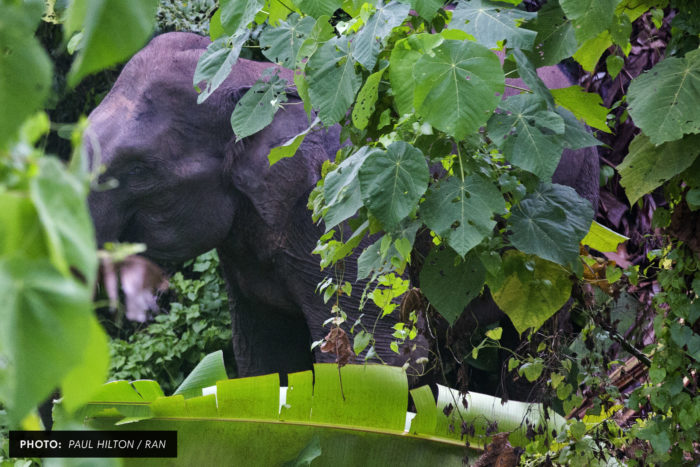The Sumatran community of Bunin faces an ongoing land conflict with PT. Tegas Nusantara, a rogue palm oil company clearing lowland rainforest in the Leuser Ecosystem
The Bunin Village, in the Serbajadi Sub-District of East Aceh, Sumatra, has stood in the foothills of the world renowned Leuser Ecosystem for generations. The community that lives here is descended from the Gayo people, one of the tribes who inhabit the highland regions in the Indonesian province of Aceh. The 298 families in Bunin work as farmers, rattan harvesters, honey collectors, and some depend on fishing in the Tamiang and Peureulak rivers as a source of their livelihood. Facing industrial incursion into their homelands, this community banded together to establish the Village Forest Management Institution (Lembaga Pengelolala Hutan Gampong/LPHG) to protect their forest from illegal logging and human-wildlife conflict, as well as manage their natural resources sustainably to further support community livelihoods. This innovative initiative provides a hopeful example which showcases one of the most successful ways to keep forests standing: by ensuring the rights of communities to manage their own lands.
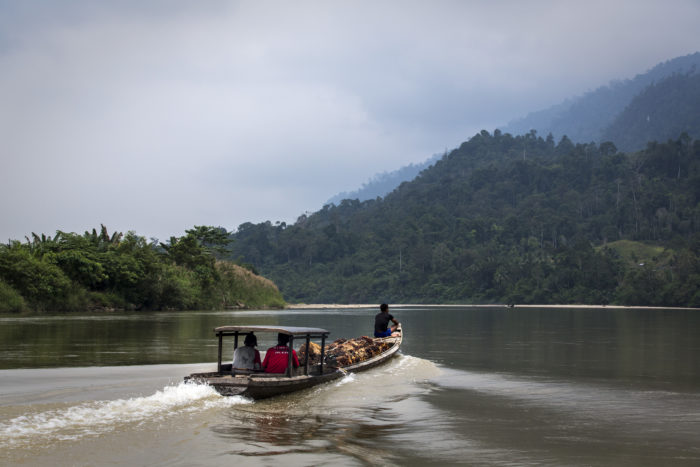
Credit: Nanang Sujana/RAN
In 2019, the Bunin community succeeded in securing legal recognition for their right to manage their 6,870 acres of lands as Village Forest. Within the approved area, another 2,938 acres were set aside as a protected forest and the remaining area of 3,931 acres are used to develop programs for community livelihood and ecotourism through the Village Forest scheme, which falls under the Indonesian Governments’ Ministry of Environment and Forestry program on expanding social forestry. Unfortunately, even with this official recognition, the community still faces threats and uncertainty, as a palm oil company called PT. Tegas Nusantara had earlier been given a permit by the government to use part of their village lands to establish a palm oil plantation. The company intended to clear lowland rainforest on their lands which is also an area known as an important habitat for critically endangered Sumatran elephants.
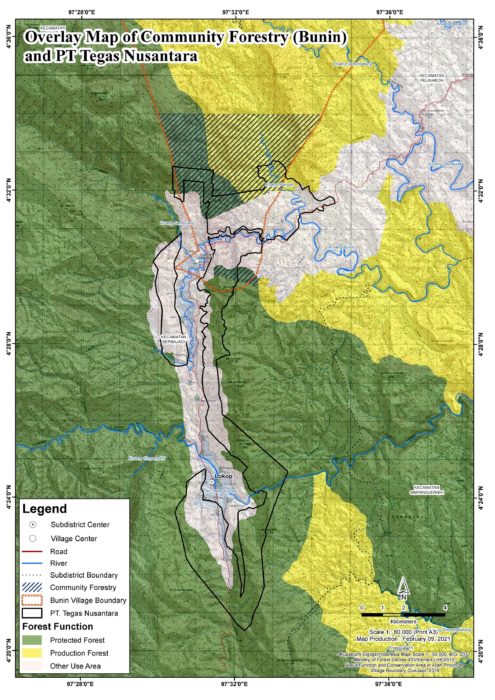
Map showing the overlapping lands of the Bunin Village (orange boundary) and the lands allocated to PT. Tegas Nusantara for palm oil development (black boundary)
PT. Tegas Nusanatara was allocated almost 13,000 acres of land for palm oil development in 2002. Since April 2016, the standing forests remaining in the areas under its management have been reduced from 7438 acres to 6933 acres ––meaning almost 500 acres of forests have been destroyed under its watch. In early 2019, RAN recorded approximately 25 acres of forest had been cleared inside PT. Tegas Nusantara’s concession. More recently, illegal logging has persisted, with small areas being destroyed most months. Satellite images show that the destruction has continued in 2021, with 10 acres cleared in January to February, and a further 15 acres lost in the following month.
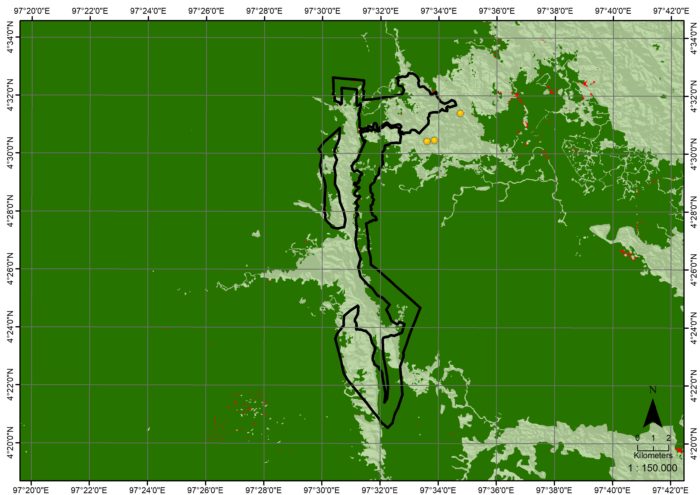
Forest loss image showing small areas of forest loss in March 2021.
The Bunin community continues to advocate for their rights to protect and manage their forests and to get part of their lands back so it is not cleared to establish a palm oil plantation. The good news is that their efforts to date to manage and protect their forests are working. This is shown by a decline in the rates of deforestation that appears to be a result of increased activities spearheaded by the community to protect their forests from encroachment and the palm oil company not pushing ahead with land clearing of the remaining forests in its concession, at present. There is hope that the residents of Bunin Village can succeed in getting their lands back and end deforestation in their home––one of the most critically important areas of lowland rainforests in the Leuser Ecosystem.
In November 2020, the Bunin community appealed to the government to revoke the company’s permit. Community leaders met with the Head of Commission I, Aceh People’s Representative Council (DPRA) asking for PT. Tegas Nusantara’s permit to be revoked because the area given to the oil palm plantation company overlaps with their village forest, a designation that has been officially verified by the Indonesian Ministry of Forestry and Environment. Time will tell if their request is granted.
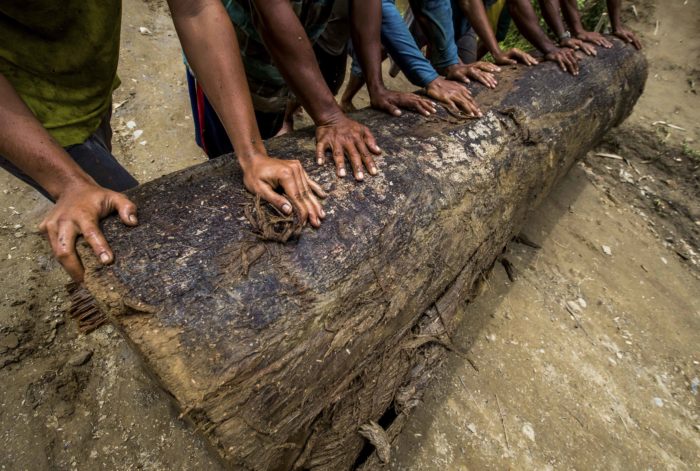
The Bunin community is just one example of the communities across Indonesia that continue to fight for the legal recognition of their customary rights to live in and manage their forests in perpetuity. We can stand in solidarity with the Bunin Village by supporting their call to revoke the palm oil permit for PT. Tegas Nusantara and by demanding action from major brands and banks to stop expansion of forest-risk commodities onto customary forests across Indonesia and throughout their global supply chains and investment portfolios. Join us as we continue to call on Ferrero, Mondeléz and Mars–– three of the most influential corporations fueling the destruction of rainforests and the violation of human rights to know and disclose their forest footprints – a critical first step in understanding which communities are affected by palm oil expansion in their supply sheds.
To date, only Nestlé has published its forest footprint in Aceh. Nestlé’s states that it recognizes the importance of identifying customary lands and understanding the risks facing communities in its palm oil supply chain, but its analysis did not identify the Bunin Village. Nor did it disclose the actions it will take to further identify communities affected by palm oil expansion across the region. Immediate steps must be taken by Nestlé to complete mapping of customary forest areas and to develop an understanding of community usage rights, land rights issues, and unresolved conflicts in Aceh––and to play its role in supporting the Bunin Village, and others across Aceh, to have their customary rights recognized and contribute where possible to the creation of alternative forest-positive livelihoods in the Leuser Ecosystem.
